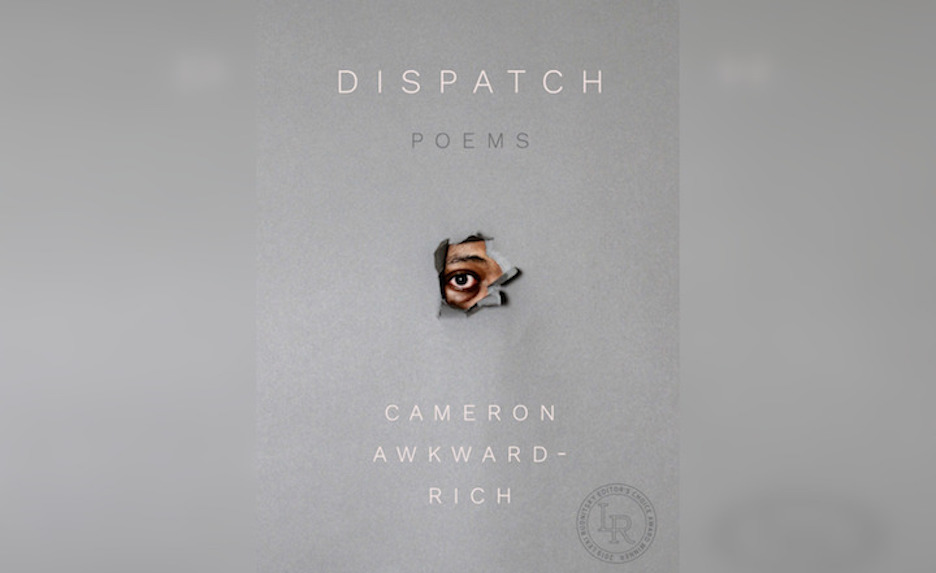In poetry, a body becomes not just a vehicle through which we move about the world, but the lens from which we write that experience. What does it then mean to comment on the world from a body that exists at the intersection of so many systems of violence? How does that violence surround and move through the body? What does one do to try and move away from it, while not moving away from their communities?
In his second collection of poetry, Dispatch, Cameron Awkward-Rich writes the pains of navigating dailiness in a body upon which the United States has historically, and presently, inflicted violence. And perhaps then, the reader is meant to read Dispatch as a verb, meaning to deal with a problem or opponent, quickly, efficiently. Synonymous with “kill”.
The collection opens with the poem, “Bad Weather”, in which Awkward-Rich is hit by a car on his way to celebrate his birthday. He writes:
…I used to fear my body
was a well anyone could toss
their wishes into, unbothered surface
pocked with light, so I’d be lying
if I said I didn’t love it, the new storm,
minor catastrophe, me
in its mute eye.
Here, Awkward-Rich plays with desires to be seen, and not to be seen. There’s some pleasure in the driver not having seen his body, for once, not being a spectacle but instead blurring into his environment. He’s able to conjure so much sensorially in his complex little phrase “mute eye,” bringing forth silence and surveillance in one fell swoop. And yet still amidst this pleasure of avoiding public spectacle as he crosses the street, there is the violence of the car hitting his body. And in that act, his body is made all the more present.
The poems refuse to shy away from gendered and racial violence in the United States. And while of course, the specter of the current president must hover over poetry that concerns itself with the current political climate, Awkward-Rich does not name him, save for one fleeting moment in “The Cure for What Ails You”:
… I’ll admit that when that man
became the president, before terrified I felt
relief—finally, here was the bald face
of the country & now everyone had to look
at it. Everyone had to see what my loves,
for their lives, could not unsee. Cruelty
after all is made of distance—
And still, here, the specificity of his name is absent. I assume from his decision not to say his name, Awkward-Rich would not want us to dwell too long on the president as he is only a more recent iteration of systematic brutality. Awkward-Rich’s refusal to say his name offers the reader a partial foil to his evocation of SayHerName politics in a poem like “Anti-Elegy”, where in spite of not saying women’s names, the poem opens with “She was:”, and continues to list ages, and cause of death (“bullet, “stabbed to death & run over by a car”, “fist”) all down the page. And while each woman is given the space and specificity of her own line, the list builds and the bullets accumulate to show the reader the vastness of American violence.
Awkward-Rich continues to play with the device of specificity when he writes “that man.” This tone of generalization sets up the poem to make clear the ways in which this man is not something new for the country, rather forces new audiences to look clearly at what other communities have always known. The poem that follows this, “Still Life”, bears the epigraph “to Lawrence Jackson, arrested in Chicago, wearing a dress, 1881”. And then the next poem “Bad News Again”, is followed by “after the June 2015 Charleston AME church shooting” perfectly calling our attention to the breadth of inflicted violence across time.
Amidst the violence and pain of the American past and present, Dispatch is interested in moments of levity or at least gesturing toward it. Dispatch is divided into three sections with each containing a poem titled “Love Poem.” While the love poems are not really concerned with sentimentality, there are moments of beauty even in the aforementioned poems “Still Life” and “Bad News Again.” In spite of their epigraphs that ground them in specific moments of violence, the poems write the body with elegance with lines like “A figure in the frame. Black dress slit / up the thigh, a voice issues from the seam/ I sit in the dark & watch your hips” in the former poem, and “One morning, on the corner / a girl, still in plaits, crowned / with butterflies, a field that sang / with every motion of her head” in the latter. The “Love Poem[s]” do the same work of writing the violence and the beauty of the body. The titles collapse in on each other.
Awkward-Rich also grounds and interrogates corporal existence through a variety of poetic forms, ranging from couplets to quatrains to erasure poems. In the collection’s penultimate poem, “[Black Feeling]”, he spans nine pages with mostly prose poems. Much like the refrain of “Love Poem”, “[Black Feeling]” is a title that surfaces four times in the collection. In its final depiction, the poem reads like a conclusion to the array of thoughts Dispatch has previously aroused. In the small daily act of waiting for the bus, he writes:
The truth is, most black folk look at you & see
a woman. White people look at you & see a
reckless boy. Either way, there you are in the
room with your body.
These prose poems demand the full space of a page. The blankness that surrounds them needs to feel anything but empty.
As a result, the reader is left with the feeling of pervasiveness, the body concludes the poem and is left to take up the rest of the space on the page. And so in the final poem, “Cento Between The Ending And The End,” the reader now knows there will be no ending to all that Dispatch has been. The poem begins with the premise “suppose you don’t die” and then imagines building a world inside your body full of the people you love that have been taken from you, the beauty you can find there. It concludes, “Oh / friends, my friends— / bloom how you must, wild / until we are free.” And so maybe then, Dispatch is not meant to mean kill at all, rather to send something off to a destination, or for a purpose.




